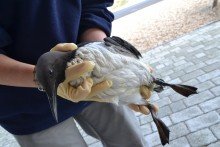• Two incidents in February and April leave at least 2400 birds dead on south west beaches and over 500 taken into care
• Death toll exceeds the number of birds affected following the beaching of the MSC Napoli in Devon in 2007.
• Public show huge support for ban on discharge of polyisobutene (PIB)
• Government urged to raise issue with International Maritime Organisation
Figures released today confirm that the number of birds affected in chemical pollution incidents off the south west England coast in 2013 has passed 2900. Hundreds were found disabled but alive and taken to RSPCA West Hatch wildlife centre in Somerset for care. To date 18 species of birds have been affected, the majority being guillemots.
In the first incident in February more than 500 birds were affected by a substance identified as PIB. The majority came onshore in Dorset. Less than two months later many more birds were found on beaches in south east Cornwall and south Devon, affected by the same substance. In contact with seawater PIB becomes strongly adhesive, coating seabirds and severely restricting their movements and preventing them from feeding.
Tony Whitehead, speaking for the RSPB in south west England said; “This is one of the worst marine pollution incidents in decades, bringing to mind other disasters going right back to the Torrey Canyon in 1967. It has sadly already exceeded the number of birds affected following the beaching of the MSC Napoli in Devon in 2007.
This is another a sobering reminder of the fragility of our marine environment and a wake up call that we must work much harder to give proper protection to our precious sealife.”
Adam Grogan from the RSPCA said: “The dumping at sea of this lethal chemical must be stopped.
“It was heart-breaking enough after the first incident in February to see so many birds arrive at our centres in such a poor state. The sticky substance coated their feathers and made it difficult for them to feed and move so staff had to work around the clock to wash it off and get them fit enough to survive in the wild again.
“For it to happen twice in quick succession is inexcusable and unacceptable.”
Wildlife charities are calling for the discharge of PIB into the sea to be banned.
Tony Whitehead added; “It’s of great concern that you can still legally wash PIB residues out of ships’ tanks at sea. We want a complete ban on any discharges of PIB and for ships to be required to remove residues safely at port. This removes the risk of any legal or indeed illegal discharges of this seabird killer.”
There has been huge public support for a ban on the currently legal discharge of PIB. The 38 Degrees and Avaaz petitions have a combined total of more than 20,000 signatures so far. Campaigners are urging the Secretary of State for Transport to formally raise the issue with the International Maritime Organisation, the body responsible for the regulation of shipping worldwide.
Abby Crosby, Marine Conservation Officer for Cornwall Wildlife Trust said; “Urgent action is required to prevent PIB causing further death and destruction within the marine environment through its discharge into the sea. To support a campaign to change the law, we need a picture of how many birds have been affected. The public have been calling our Hotline in droves and our brilliant strandings volunteers have been sending in their reports but, as dead birds may continue to wash up, we need to keep on recording.”
Steve Hussey, speaking for Devon Wildlife Trust, said: “It’s especially disappointing that we still seem no closer to finding the source of this devastating pollution incident. This raises a serious question as to whether the Maritime and Coastguard Agency has the resources to track down the culprits. Without this vital ‘detective work’ the south west’s wildlife, its coastal communities and economy will remain at the mercy of further pollution incidents in the future.”
Peter Tinsley, Living Seas Manager at Dorset Wildlife Trust, said: “This time the birds coming ashore in Dorset are dead and all we can do is record numbers to show the scale of the impact of this incident. Though PIB is not technically toxic, it is clearly lethal to seabirds and probably to other marine life and should not be discharged into the sea.”
Mark Grantham, from the British Trust for Ornithology, is carrying out post-mortem analysis of hundreds of the dead birds (the results of which will be published in the next few weeks) and commented; “In pollution incidents such as this it is important to properly understand the impact on seabird populations locally, nationally and even internationally. We can only do this by looking at the age, breeding status and origin of birds killed, by looking for ringed birds but also through taking measurements. The timing of this incident will have contributed to the large number of casualties, as many sub-adult birds will have been moving back into breeding areas at this time, but where this impact will be most noticeable isn’t yet known.”
Members of the public wishing to add their voice to calls for the discharge of PIB into the sea to be banned are encouraged to sign both the 38 Degrees petition and the Avaaz petitions and to contact their own MP and ask them to raise the issue with the minister responsible.
How you can help
The seas around the UK’s coasts are increasingly overfished, over-trafficked and over-developed, but crucially under-protected. Your support today will help safeguard our sea life.







